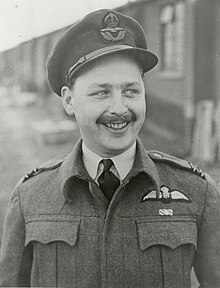
Hurricanes from 151 Squadron (also from North Weald), and Spitfires from 54, 65 and 74 Squadrons based at Hornchurch Airfield scrambled. With the war only three days old, none of the Royal Air Force pilots had seen combat and few had seen a German aircraft. Communication between the pilots and command centres was poor and there was no procedure for pilots to distinguish between British and Luftwaffe aircraft. Identification friend or foe (IFF) sets were still being developed and had not been installed in many RAF aircraft.
With everyone in the air expecting to see enemy aircraft and no experience of having done so, 'A' Flight of 74 Squadron saw what they believed were German aeroplanes and their commander, Adolph "Sailor" Malan, allegedly gave a clear and definite order to engage. Two of the three, Flying Officer Vincent 'Paddy' Byrne and Pilot Officer John Freeborn, opened fire.
Malan later claimed to have given a last minute call of "friendly aircraft – break away!" but whether this was true, the call was not heard by the attacking pilots. Richard Hough and Denis Richards wrote that further losses were prevented by the 151 Squadron commanding officer, Squadron Leader Edward Donaldson, who alerted his pilots that the attacking aircraft were British and gave the order not to retaliate.


 Frank Rose and Pilot Officer Montague Hulton-Harrop were shot down and Hulton-Harrop was killed. Fired upon by John Freeborn, he had been hit in the back of the head and was dead before his Hurricane crashed at Manor Farm, Hintlesham, Suffolk, about 8.0 km west of Ipswich. Hulton-Harrop was the first British pilot fatality of the war and his Hurricane was the first aircraft shot down by a Spitfire.
Frank Rose and Pilot Officer Montague Hulton-Harrop were shot down and Hulton-Harrop was killed. Fired upon by John Freeborn, he had been hit in the back of the head and was dead before his Hurricane crashed at Manor Farm, Hintlesham, Suffolk, about 8.0 km west of Ipswich. Hulton-Harrop was the first British pilot fatality of the war and his Hurricane was the first aircraft shot down by a Spitfire.One Spitfire was shot down by British anti-aircraft fire
The court martial of John Freeborn and Paddy Byrne at Fighter Command's Bentley Priory headquarters was held in camera, and, as of 2010, the papers have not been released.
According to author Bill Nasson, it is well known that Freeborn felt that his commanding Officer, Sailor Malan, tried to evade responsibility for the attack. Malan testified for the prosecution against his pilots, stating that Freeborn had been irresponsible, impetuous and had not taken proper heed of vital communications.
During the trial, Freeborn's counsel, Sir Patrick Hastings, called Malan a bare-faced liar. (Hastings's deputy was Roger Bushell, later to be incarcerated with Paddy Byrne at Stalag Luft III and the mastermind of the Great Escape.)
The court exonerated both pilots, ruling that the case was an unfortunate accident.
-----------------
 John Connell Freeborn, DFC & Bar (1 December 1919 – 28 August 2010) was a fighter pilot and flying ace in the Royal Air Force (RAF) during the Second World War. He also held the distinction of having flown more operational hours than any other RAF pilot during the Battle of Britain.
John Connell Freeborn, DFC & Bar (1 December 1919 – 28 August 2010) was a fighter pilot and flying ace in the Royal Air Force (RAF) during the Second World War. He also held the distinction of having flown more operational hours than any other RAF pilot during the Battle of Britain.On 6 September 1939, Freeborn took part in an action later called the Battle of Barking Creek – a tragic misunderstanding in which two No. 56 Squadron Hurricanes were intercepted and shot down by aircraft from No. 74 Squadron, thereby becoming the first aircraft destroyed by a Spitfire. Freeborn shot down the aircraft of Pilot Officer Montague Hulton-Harrop, who became the first RAF pilot to die in World War II.
Freeborn felt that his commanding officer, Sailor Malan, tried to evade responsibility for the attack. At the ensuing court martial, Malan testified for the prosecution against his own pilots, stating that Freeborn had been irresponsible, impetuous, and had not taken proper heed of vital communications. During the trial, Freeborn's counsel, Sir Patrick Hastings, called Malan "a bare-faced liar!".
Though the court exonerated Freeborn completely, he regretted the death of Hulton-Harrop for the rest of his life. In 2009, he said, "I think about him nearly every day. I always have done... I've had a good life, and he should have had a good life too."
Whilst Freeborn and Malan's working relationship continued to be professional and exceptionally effective, the case strained their personal relationship. It is noteworthy that Malan did not recommend Freeborn for either of his subsequent medals.On Malan's departure in March 1941, Freeborn was not given command despite being eminently capable and far more experienced than the man who did take over.
--------------------
In 1990, Hough and Richards wrote,
This tragic shambles, hushed up at the time, was dubbed in the RAF 'the Battle of Barking Creek' – a place several miles from the shooting-down but one which, like Wigan Pier, was a standing joke in the music halls.
- Hough and Richards
It has been suggested by RAF historians that the incident exposed the inadequacies of RAF radar and identification procedures, leading to them being greatly improved by the crucial period of the Battle of Britain
Ei kommentteja:
Lähetä kommentti
Kaikenlaiset kommentit ovat tervetulleita.